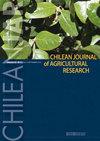Effect of biochar amendments on the growth and development of ‘Vera’ crisp lettuce in four soils contaminated with cadmium
IF 1.7
4区 农林科学
Q2 Agricultural and Biological Sciences
引用次数: 0
Abstract
Cadmium is an extremely toxic heavy metal that affects agricultural lands, concentrations above 0.2 mg kg-1 in leafy vegetables is restricted for human consumption. Biochar is a promising amendment for degraded soils with low fertility and high levels of heavy metals contamination, since it can reduce Cd2+ levels in vegetables. However, these reductions depend on the nature of the soil and biochar properties. This pot experiment in greenhouse conditions evaluated the effect of biochars amendments under Cd stress conditions on lettuce (Lactuca sativa L. var. crispa L.) plants grown in four soils: Ferralsol (FS), Andosol (AS), Umbrisol (US) and Technosol (TS). Six treatments were compared: Biochars doses at 3, 6, 9 and 12 t ha-1, conventional fertilization (NPK) and control absolute. Biochars were obtained by slow pyrolysis from five agricultural residues: Palm empty fruit bunches (PEFBB), palm kernel (PKB), wood waste (WWB), coffee pulp (CPB) and rose stems (RSB). The CPB amendment resulted in a fresh weight plant increase of 238% to 323% in 3 to 12 t ha-1 comparing with control treatment, while WWB induced a fresh weight decrease of 90.85%. The PKB amendment presented a 20% additional fresh weight in comparison to PEFBB in Ferralsol. These results indicate that biochar positively contributes to the water status. Application of RSB at 12 t ha-1 resulted in a decrease of 50.61% in Cd concentration and a decrease of 37.4% in Cd concentration in CPB at a 12 t ha-1, both results representing promising alternatives to remediate contaminated soils. The AS+CPB and US+RSB assays showed a significant negative correlation of leaf Cd concentration when increasing biochar doses were used indicating the mitigation of the phytotoxic effect of Cd in plants.生物炭改良剂对四种镉污染土壤中维拉脆莴苣生长发育的影响
镉是一种影响农田的剧毒重金属,叶菜中镉的浓度超过0.2 mg kg-1是限制人类食用的。生物炭可以降低蔬菜中Cd2+的含量,是一种很有前景的改良土壤的方法,可以改善低肥力和高重金属污染的退化土壤。然而,这些减少取决于土壤的性质和生物炭的特性。本试验在温室盆栽条件下,评价了Cd胁迫条件下生物炭改性对莴苣(Lactuca sativa L. var. crispa L.)在4种土壤(Ferralsol (FS)、Andosol (AS)、Umbrisol (US)和Technosol (TS))生长的影响。比较6种处理:生物炭3、6、9和12 t hm -1,常规施肥和绝对对照。以棕榈空果束(PEFBB)、棕榈仁(PKB)、废木材(WWB)、咖啡浆(CPB)和玫瑰茎(RSB) 5种农业废弃物为原料,进行慢速热解制备生物炭。在3 ~ 12 t hm -1处理中,CPB处理使植株鲜重比对照增加238% ~ 323%,而WWB处理使植株鲜重减少90.85%。与Ferralsol中的PEFBB相比,PKB修正案增加了20%的新鲜重量。这些结果表明,生物炭对水状况有积极的贡献。在12 t ha-1下施用RSB, Cd浓度下降50.61%,CPB中Cd浓度下降37.4%,这两个结果都是修复污染土壤的有希望的选择。AS+CPB和US+RSB试验表明,增加生物炭剂量与叶片Cd浓度呈显著负相关,表明Cd在植物中的毒性作用得到缓解。
本文章由计算机程序翻译,如有差异,请以英文原文为准。
求助全文
约1分钟内获得全文
求助全文
来源期刊
CiteScore
3.00
自引率
11.80%
发文量
60
审稿时长
6 months
期刊介绍:
ChileanJAR publishes original Research Articles, Scientific Notes and Reviews of agriculture, multidisciplinary and agronomy: plant production, plant protection, genetic resources and biotechnology, water management, soil sciences, environment, agricultural economics, and animal production (focused in ruminant feeding). The editorial process is a double-blind peer reviewing, Editorial Office checks format, composition, and completeness, which is a requirement to continue the editorial process. Editorial Committee and Reviewers evaluate relevance and scientific merit of manuscript.

 求助内容:
求助内容: 应助结果提醒方式:
应助结果提醒方式:


